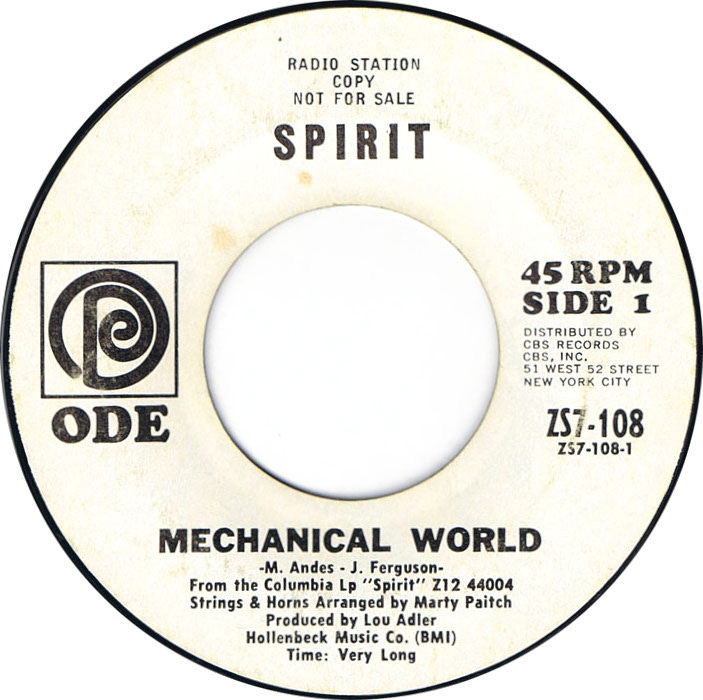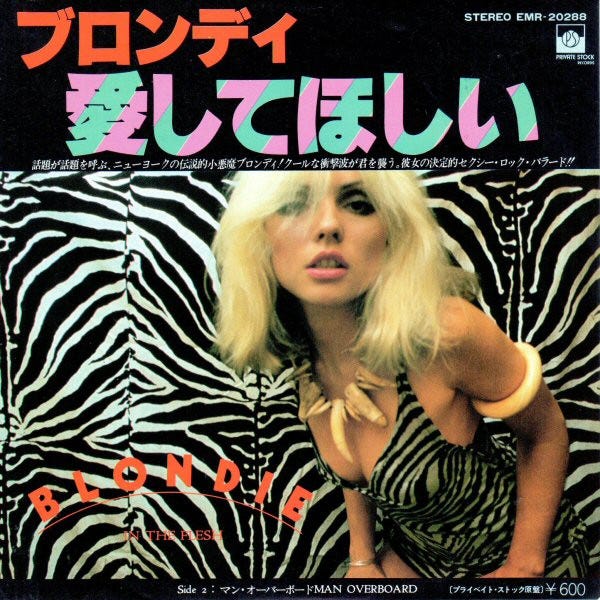Spirit and Blondie are two bands that have never, ever occupied the same thought bubble in my mind.
I mean, why would they? Spirit were five hippie freaks whose jazz-influenced approach to psychedelia set them apart from the rest of the late-’60s L.A. scene; their most recognizable member was the bald drummer who was at least two decades older than everyone else in the band. Blondie, on the other hand, spearheaded the pop-art wing of ’70s NYC punk, and boasted that era’s most iconically beautiful frontwoman. Musically, aesthetically, geographically and physiognomically, the two groups would seem to have absolutely nothing in common — save for each having a Jewish lead guitarist who often favored heavily-sustained tones. But we’ll get to that…
I should probably admit that, while I love the first four Blondie albums like I love life itself — and have done so since high school — I have never been able to get into Spirit’s acclaimed catalog, despite numerous attempts over the years. I don’t dislike their music at all (and I genuinely love a few of their songs, especially “I Got a Line On You,” “Jewish” and “Nature’s Way”); in fact, I really want to like it, as I dig vintage psychedelia of all varieties, and appreciate that their chosen path was a uniquely creative one. And yet, for whatever reason, the majority of Spirit’s music has consistently gone in one ear and out the other without ever registering in my brain. I must have heard, say, “Girl in Your Eye” or “The Great Canyon Fire in General” dozens of times since stumbling upon the band’s self-titled 1968 debut in a thrift shop bin some 35 years ago, but I still can’t tell you how those songs go. My memories of Arthur Lee mercilessly heckling Randy California at a 1994 Love/Spirit show remain way more vivid than my impressions of most of Spirit’s music.
That said, there are occasional moments where a Spirit track will catch me off guard, and I’ll hear it again with fresh ears. Case in point, “Mechanical World,” the band’s debut single, which popped up at random the other day on a Spotify playlist I’d made of all the songs that had reached the Billboard Hot 100 — or just “bubbled under” — during 1968. (And yes, said playlist runs nearly 34 hours long, because that’s how I roll.)
“Mechanical World” only reached #123 in early ‘68, probably because a five-minute, fifteen-second single that opens with the dreary lament of “Death falls so heavy on my soul” wasn’t exactly what your average AM radio deejay was looking to spin between traffic reports and ad spots for pimple cream.
Quite frankly, “Mechanical World” wasn’t exactly what I wanted to hear at this moment, either. I’d just dropped my girlfriend off at her house after a blissful weekend together, and I was now driving home on a perfect sunny afternoon through the bucolic beauty of the western Hudson Valley; after a string of feel-good ’68 hits like Johnny Rivers’ “Summer Rain,” Al Green’s “Back Up Train” and Sly and the Family Stone’s “Dance to the Music,” this lumbering Brecht-psych bummer hit me like the aural equivalent of a turd landing in a punch bowl. But since I also happen to find turds inherently amusing, I decided to let it ride (or float) for a bit; maybe this time, I thought, I would actually find something about the song that I dug.
I didn’t have to wait long. During the first verse, I was impressed by the dramatic strings that accentuated the line, “Somebody tell my father I died,” which immediately put me in mind of the psychedelic soul bursts that legendary Chess/Cadet Records producer/arranger Charles Stepney employed on records by the Rotary Connection — though further research would reveal that this string arrangement was the work of veteran Hollywood conductor/arranger Marty Paich (father of future Toto co-founder David Paich, who also appeared uncredited on this song). And then, around the 1:22 mark, lead guitarist Randy California stepped up to take his first solo…
California’s guitar playing has always been one of the few things about Spirit’s music that I’ve really been able to grab on to, especially the saturated, “swarm of seriously stoned bees” tone he used for his solos on “Mechanical World” and many of the band’s other songs. So I keyed in on his playing… and suddenly perked up when, around the 1:47 mark, he started playing a repeated single-note figure that sounded incredibly familiar to me. Where did I know it from? I immediately recognized it as being from another, non-Spirit song, but I couldn’t put my finger on which one. Something from the ’70s, maybe? I turned off my car audio and started singing that part aloud to myself, hoping that would kick something loose in my mind. It didn’t.
Now, this is exactly the sort of puzzle that can keep me up into the wee hours, or even drive me crazy for days at a time. I still ruefully recall the night a few years back when I took the “wrong” gummy before bed, and then spent most of the night trying to figure out whence the unbidden guitar figure that was dancing non-stop in my head had come. (I was able to get to sleep only after finally identifying it as the second guitar break from Alice Cooper’s “Be My Lover”.) This time, though, I simply made a mental note to listen to the song again when I got home… and promptly forgot all about it.
On Monday, while doing laundry, I suddenly found myself singing “Man Overboard,” the song that leads off Side 2 of Blondie’s self-titled 1976 debut album. A campy, mildly funky number that’s closer to Broadway than the Bowery, “Man Overboard” has never been one of my favorite Blondie songs. It’s still catchy as all hell, though, and I figured I must have just read something that unconsciously triggered my ear worm. But as the song played on in my mind, I recalled a guitar solo that sounded suspiciously like… wait a minute, did Blondie’s Chris Stein rip off Randy California?!?
I pulled Blondie out of my record shelves, and sure enough — not only does Stein play a faster but similarly sustain-heavy version of the exact same solo (with a few additional notes thrown in between the repeats) at the 2:11 mark of “Man Overboard,” but keyboardist Jimmy Destri also uses the same motif earlier in the song (1:22) as the outro from his classically-tinged synth solo. What the hell?
I suppose it makes sense, though. Debbie Harry — who is credited as the sole songwriter of “Man Overboard” — not only did time in the late-‘60s hippie-folk group The Wind in the Willows, but she also lived in Southern California for a while before returning to NYC and getting involved in the music scene revolving around Max’s Kansas City, the Mercer Arts Center and CBGB. Surely she’d have encountered Spirit’s first album somewhere along the way. And both Stein and Destri were known to have pretty wide-ranging musical tastes, so if it was one of them who brought that lick to the table, it’s not inconceivable that they would have been Spirit fans as well.
The obvious similarities between Led Zeppelin’s “Stairway to Heaven” and Spirit’s “Taurus” have been rehashed in the press many times over the years, not least because California’s estate took the surviving members of Zep to court over it. (And somehow lost, though that’s a whole other story.) But I don’t recall anyone ever mentioning “Man Overboard”’s obvious lift from “Mechanical World” before, or Chris Stein ever mentioning Randy California as a guitar influence. Not that it’s the sort of thing Spirit could (or should) have sued over; but it’s still fascinating to me, because I love tracing the lines of influence from artist to artist, and because I would never have guessed in a million years that Blondie would have been influenced by Spirit in any way.
It also makes me wish that Blondie had tried their hands at a Spirit cover — especially the hard-rocking “I Got a Line On You,” which would have been a perfect fit for Debs’ deliciously deadpan delivery, a la her band’s cover of T. Rex’s “Bang a Gong (Get It On)”. But since that version doesn’t actually exist, and because I can’t resist lobbing an occasional turd into the punchbowl myself, I’ll instead close today’s JTL entry with this bloated-yet-festive rendition of “I Got a Line On You” from the 1984 Spirit reunion album Spirit of ‘84. The album — which was retitled The Thirteenth Dream for overseas release, for some reason — featured a whole gaggle of guest stars, including Jeff “Skunk” Baxter, Bob Welch, Joe Lala, Gary Myrick and various members of Heart, The Knack and REO Speedwagon. They pretty much all appear in this deeply goofy video, though the Devil’s Tower-sized pile of cocaine that apparently fueled the filming remains off-camera.
I used to see this video all the time during the summer of 1984, when it was in regular rotation on Channel 66, the Chicagoland Area’s short-lived MTV substitute. My initial reaction was definitely something along the lines of “What is this shit?” — but once I figured out that it was a Spirit reunion combined with a third-string L.A. All Star jam, the trashy absurdity of it all kinda warmed my heart. Not sure what it says about me that I genuinely enjoy this ridiculous clip more than I do most of the tracks on, say, Twelve Dreams of Dr. Sardonicus, but there ya go…






Another fantastic article, Dan! I love the way your brain works.
Just as I always suspected, your brain is totally bubbled. I told you not to sniff that bubble wand mixture! But a Blondie bubble isn’t so bad. I’ve got one too!